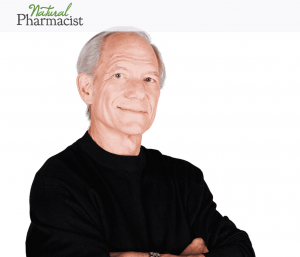
Hello, my name is Ross Pelton. I am a pharmacist, nutritionist, author, and a health educator. My specialty is natural medicine and nutrition. I am also the world’s leading authority on the topic of drug-induced nutrient depletions. My website, bio and blog are available at: https://naturalpharmacist.net/. Here is a link for a FREE copy of my Quick Reference Guide to Drug-Induced Nutrient Depletions: https://naturalpharmacist.net/dind
In April 2020, I published an article in Integrative Medicine: A Clinician’s Journal about the cardiovascular benefits of daily Coenzyme Q10 supplement [1]. As most of you know, Coenzyme Q10 is an important antioxidant, and it also plays critical roles in the mitochondrial production of energy in the form of ATP.
Endogenous production of Coenzyme Q10 peaks at about 20 years of age and then gradually declines throughout our adult years. One estimate is that the heart muscle cells of an 80-year-old will produce about half of the Coenzyme Q10 that the heart muscle cells of a 20-year-old will [2]. It is not practical to think about making up the difference by eating more or better. Consequently, daily CoQ10 supplementation is important [3].
Sources of Coenzyme Q10
Although humans get some Coenzyme Q10 from dietary sources, it is estimated that 75% of our CoQ10 comes from the biosynthesis of CoQ10 within cells throughout the body [3]. The biosynthesis of CoQ10 from the amino acid tyrosine is a multi-stage process requiring at least eight vitamins and several trace elements.
Considering the widespread consumption of nutrient-deficient fast foods and highly processed foods and the fact that nutritional content of our commercial food supply has been steadily declining since the end of World War II, due to the use of toxic chemicals, artificial fertilizers, and other destructive farming practices, it is easy to see why many people have nutritional deficiencies that hinder the body’s ability to synthesize Coenzyme Q10.
Moreover, numerous classes of drugs interfere with the body’s ability to synthesize CoQ10 [4] These factors make it important for people to regularly supplement with Coenzyme Q10.
CoQ10 Supplementation to Reduce Frequency and Duration of Migraine Attacks
Today, I want to draw your attention to the benefits of CoQ10 supplementation for migraine sufferers. Migraine is a common and debilitating disease that affects more than one in ten adults world-wide [5].
Most migraine medications are intended to reduce the frequency and intensity of migraine headache attacks while very few migraine medications prevent migraine attacks. A recent meta-analysis from six randomized controlled trials reported that CoQ10 supplementation reduces the duration and frequency of migraine headaches [6].
There is some evidence that low levels of the micronutrients such as riboflavin, magnesium, vitamin B12, and Coenzyme Q10 are associated with the incidence of migraine headaches [7]. Coenzyme Q10 has antioxidant and anti-inflammatory effects that may explain how it helps to reduce the frequency and duration of migraine attacks [8].
BMJ Open journal article: Coenzyme Q10 and migraine
A research team from a university in Malaysia reviewed the data from six randomized controlled trials enrolling 371 migraine sufferers of both genders aged 18 to 50 years. None of the 371 study participants had been on migraine preventive drugs in the six months prior to the study they took part in [9].
The researchers revealed the following findings:
- There was no statistically significant reduction in severity of migraine headache with CoQ10 supplementation.
- CoQ10 supplementation significantly reduced the duration of the migraine headache attacks compared with a placebo group.
- CoQ10 supplementation significantly reduced the frequency of migraine headaches compared with a placebo group.
In one of the six studies, the researchers reported that CoQ10 supplementation significantly reduced the number of days with nausea due to migraine. None of the other five studies reported on nausea.
Dosage and Duration of the CoQ10 Supplementation
This is good news indeed. Here are the different dosages used in the six studies.
- A minimum of 30 mg per day
- 300 mg per day
- 400 mg per day (2 studies)
- 600 mg per day
- 800 mg per day
Remember, please, that you will get better absorption and more benefit if you take your Coenzyme Q10 in divided doses with meals. So, for example, 3 x 100 mg per day or 3 x 200 mg per day.
The duration of the CoQ10 supplementation also differed: 8 weeks in one study and 3 months in the other 5 studies. Probably you need to take the Coenzyme Q10 for at least 12 weeks to begin to see a beneficial effect.
Coenzyme Q10 for Preventing Migraine
The bottom line is that we have some good solid evidence that supplementation with Coenzyme Q10 reduces the number of migraine attacks each month and reduces the duration of the migraine attacks.
How To Select a Coenzyme Q10 Supplement?
Many CoQ10 products have horribly low rates of absorption, literally only 1-2%. This is primarily due to what I refer to as The CoQ10 Crystallization Problem. The melting point of Coenzyme Q10 is 10 degrees Celsius higher than human body temperature. Hence, at room temperature and/or in the stomach after oral ingestion, the CoQ10 forms crystals. We cannot absorb “clumps” (i.e. crystals) of Coenzyme Q10; we can only absorb single molecules in solution. Hence, many people spend a significant amount of money on CoQ10 supplements but get very little benefit because of poor absorption.
The Oil Matrix
Coenzyme Q10 is a fat-soluble nutrient. Consequently, many companies dissolve CoQ10 in some form of oil and market their product in gel caps. However, there is a wide variation in how well the various oils are able to keep CoQ10 in solution.
Dr. William Judy is a highly respected Coenzyme Q10 scientist. Dr. Judy’s research has revealed that the following two important factors determine the absorption (and effectiveness) of Coenzyme Q10 supplements:
- The composition of the oil matrix in which the CoQ10 is dissolved
- The heating and cooling process used prior to filling the Coenzyme Q10/oil mixture into the soft-gel capsules
These are the factors that differentiate between a product with the CoQ10 dissolved in oils vs a product with undissolved CoQ10 crystals. Getting the right formulation takes time and money; consequently, less expensive CoQ10 preparations may well be a waste of money.
Ubiquinone vs Ubiquinol
In 2006, Kaneka Corporation in Japan began marketing the ubiquinol (the reduced form of CoQ10) product with claims that it was better absorbed than ubiquinone and, hence, more effective. This has been a very successful marketing strategy for Kaneka, but, actually, the claims are not scientifically accurate. Studies have shown that when ubiquinol is ingested, it is quickly oxidized by gastric acid to ubiquinone before it is absorbed [10].
Drug-Induced Nutrient Depletions
I am the author of The Drug-Induced Nutrient Depletion Handbook [11]. In this handbook, I present peer-reviewed scientific studies that document that 11 different classes of drugs deplete Coenzyme Q10 reservoirs in the body. The classes of drugs that deplete CoQ10 are the following:
- oral contraceptives
- hormone replacement therapy (HRT)
- tricyclic antidepressants
- adrenergic stimulants
- thiazide diuretics
- antipsychotics
- statins
- most chemotherapy drugs
- beta-blockers
- oral hypoglycemics: both sulfonylureas and biguanides
It is easy to see why many people are Coenzyme Q10 deficient due to poor diets and low nutrient intake and the fact that many people are taking drugs that deplete Coenzyme Q10.
The Drug-Induced Nutrient Depletion Handbook is out-of-print. However, I have created a Quick Reference Guide to Drug-Induced Nutrient Depletions. As part of my commitment to help people improve their health, I am offering this Quick Reference Guide FREE to everyone. Use the link below to get your free copy of the Quick Reference Guide to Drug-Induced Nutrient Depletions and feel free to distribute this offer to your patients, family and friends.
Click here for a FREE copy of Quick Reference Guide to Drug-Induced Nutrient Depletions.
During my decades of work as a retail pharmacist, I have made a point of counseling patients about the importance of taking Coenzyme Q10 as a nutritional supplement if they were taking one of the medications that interfere with the biosynthesis of Coenzyme Q10, e.g. statin medications.
Conclusion
Coenzyme Q10 is a powerful fat-soluble antioxidant, and it reduces inflammation. CoQ10 is also a key nutrient required for energy production in mitochondria and, at the same time, it protects mitochondrial DNA (mDNA) against free radical damage. Because these functions are so critical to health, I believe that Coenzyme Q10 should be recognized as a supplement that slows down the biological aging process and promotes healthy longevity.
References
[1] Pelton R. Coenzyme Q10: A Miracle Nutrient Advances in Understanding. Integrative Medicine: A Clinician’s Journal (IMCJ). April 2020;19(2):16-21.[2] Kalen A, et al. Age-related changes in the lipid compositions of rat and human tissues. Lipids. 1989 Jul; 24(7):579-84.[3] Weber C. Dietary intake and absorption of Coenzyme Q. In: Kagan VE, Quinn PJ, eds. Coenzyme Q: Molecular Mechanisms in Health and Disease. Boca Raton: CRC Press; 2001:209-215.[4] Pelton R. The Drug-Induced Nutrient Depletion Handbook. Lexi-Comp. 2nd Edition, 2001.[5] Woldeamanuel YW and Cowan RP. Migraine affects 1 in 10 people worldwide featuring recent rise: A systematic review and meta-analysis of community-based studies involving 6 million participants. Journal of the Neurological Sciences. Jan 2017;372:307-315.[6] Sazali S, et al. Coenzyem Q10 supplementation for prophylaxis in adult patients with migraine—a meta-analysis. Neurology. Jan. 6, 2021;11(1). https://bmjopen.bmj.com/content/11/1/e039358[7] Bianchi A, et al. Role of magnesium, Coenzyme Q10, riboflavin and vitamin B12 in migraine prophylaxis. Vitamin Horm. 2004;69:297-312.[8] Dahri M, et al. Oral Coenzyme Q10 supplementation in patients with migraine: Effects on clinical features and inflammatory markers. Nutritional Neuroscience. 2019 Sep;22(9):607-615.[9] Ibid. Sazali 2021.[10] Judy WV. Coenzyme Q10: The Substance That Powers Life, An Insider’s Guide. 2018. ISBN: 978-87-7776-186-7. Figure 20 on page 60.[11] Pelton R. The Drug-Induced Nutrient Depletion Handbook (2nd Edition). Hudson, OH, Lexi-Comp, 2001.
The information presented in this review article is not intended as medical advice and should not be construed as such.




Leave A Comment